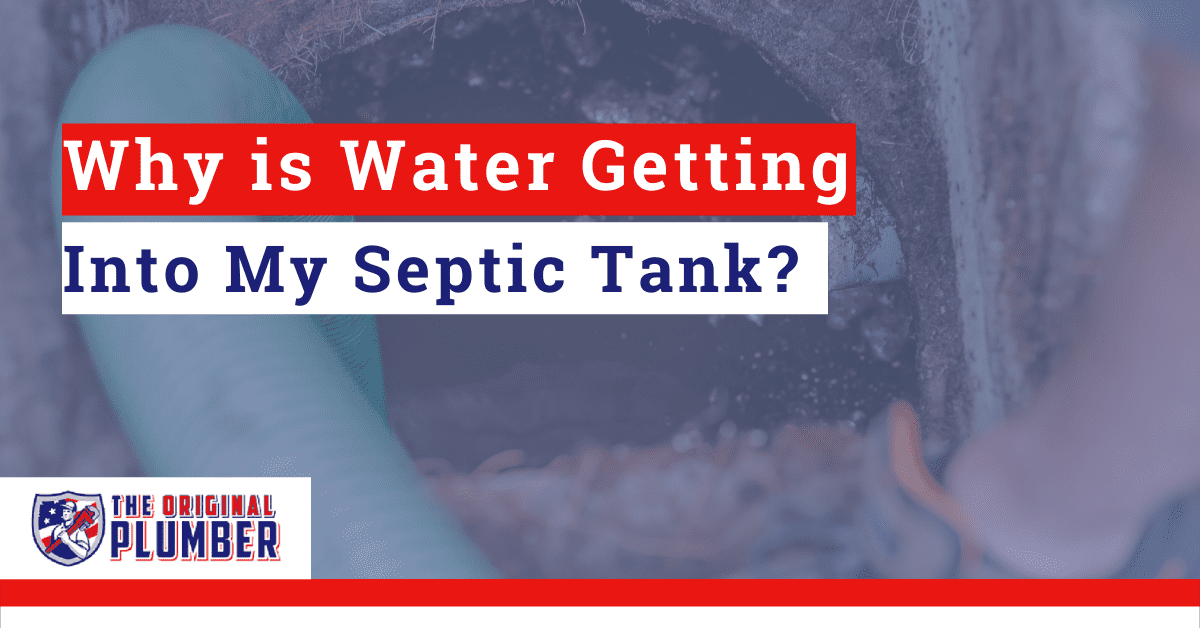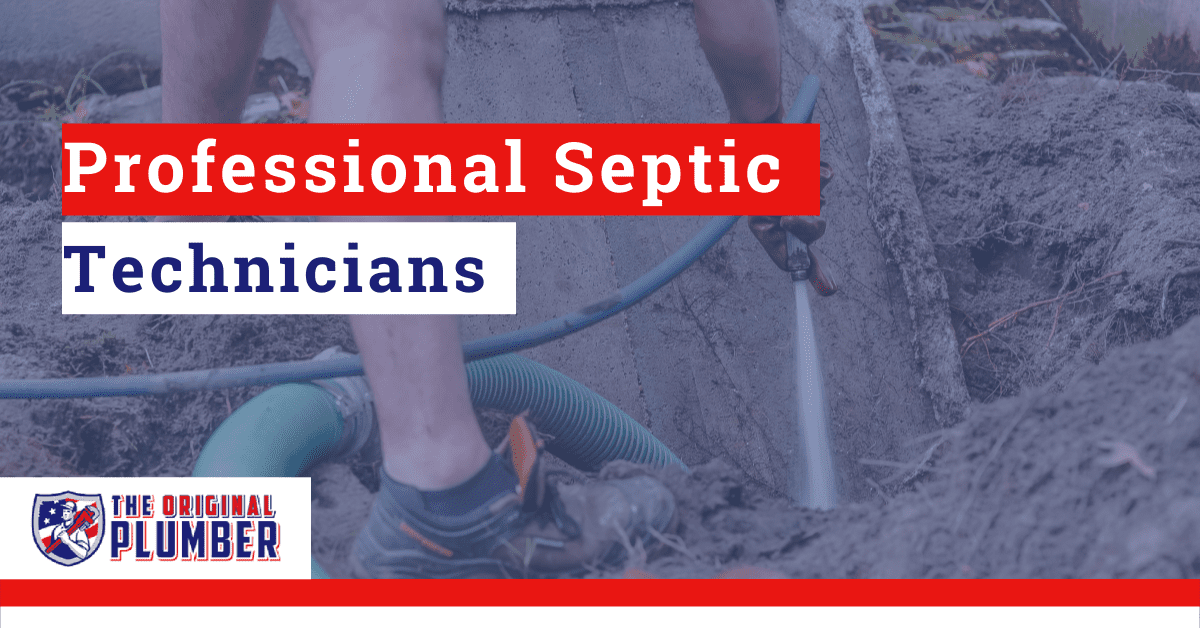You might not think water in your septic tank is a big deal. That’s where the water from your home is supposed to wind up, right? Well yes and no… If you find yourself thinking “my septic tank keeps filling up with water,” that’s not normal and you might have an overflowing septic tank on your hands.
Keep reading to learn why your septic tank might be filling with water and what you need to do to fix it.
How Does My Septic System Work?
One of the first things most homeowners need to know is how septic systems work on the most basic level. A septic tank is a concrete or plastic tank buried somewhere near your home. The size of the tank is based on the size of your home.
If you do construction and add on to your home, you’ll want to be sure that your septic tank will still work for the new size of your home. If your current tank does not meet the requirements for the new square footage, you’ll want to include a larger tank in your budget.
Septic tanks all need water inside the tank to help the entire breakdown process for the solid waste in your septic system. It’s not abnormal to have a normal liquid level and the high water level inside your septic tank. If you’re not sure how to check the water level in your septic tank or how much your septic tank holds, or what’s normal or high, ask your septic technician during your next inspection.
Everything that goes down your drains from your home winds up in your septic tank. Water, chemicals, and human waste all get added to your septic tank on a regular basis so it’s important to be very careful about what you’re putting down your drains to avoid clogs or damage.
As part of your normal routine, adding these items to your septic system isn’t harmful. It can become a problem when you add large amounts of water or things that don’t belong in your septic tank, like chemicals, feminine hygiene products, or anything other than organic waste.
The naturally occurring bacteria and enzymes inside all septic tanks will work to break down solids and waste so it can flow out through the pipes into your drain field. When the bacteria can’t break down the solids quickly enough, those solids can cause clogs in the drain pipes and the wastewater can stay inside your tank and back up.
All septic systems need regular inspections and maintenance, like anything else, to continue to function properly. You should consult your septic technician to see how frequently you need to have an inspection and have your septic tank pumped because every septic system is different. Most septic tanks need to be pumped every three to five years if they’re being properly maintained as a general guideline.
In addition to the actual septic tank, you’ve also got a drainage system called a drain or leach field. As the bacteria and enzymes inside your tank break down the natural waste, small pieces of waste flow out of the tank through drain pipes and into the leach field with liquid waste to be absorbed into the soil.
Most of the same signs that your septic tank is filling with water are also signs of a clog or that your tank needs to be pumped so it can be hard to tell exactly what’s causing the problem without having your septic system fully inspected by a professional. Don’t be afraid to call a professional if you have questions or concerns about your septic system.
Why is Water Getting Into My Septic Tank?
An overflowing septic tank isn’t something anyone wants to deal with. If your tank is filling up with water, you’re probably looking for a way to fix it as soon as possible. There are a lot of different reasons why water is filling up over the normal liquid level in your septic tank:
- Using too much water. Your septic tank is set up for normal usage based on the size of your house. If your septic tank is filling up with household wastewater quickly, one of the first things you can look at is your water usage and you need to reduce excess water usage. Make sure that you’re not leaving the water running while washing the dishes or letting the water run too long while you’re waiting for it to warm up to take a shower or bath.
- Watch what’s going down the drains. Flushing wads of toilet paper down the drain is not only harder for the bacteria in your tank to break down, but it can also cause a clog in your pipes before it even reaches the septic tank. Dumping grease or chemicals down the drain can also cause damage to your septic system. Also avoid flushing things like baby wipes, paper towels, feminine hygiene products, and other things down the toilet to avoid clogs and other damage.
- Damage to your septic system. If your pipes or septic tank have cracks, wastewater can seep out of your septic tank, but other groundwater can also get into your tank, causing it to fill up quickly. Damage can also occur if someone drives over your septic tank, causing cracking or breaking in the tank.
- Heavy rainfall and standing water. You may notice that your septic tank fills up with water more quickly after excessive rain or rainstorms that last over several days soaking the ground. As the ground feels more saturated, all the rain needs somewhere to go.
- Damaged drain field (also called a leech field). The water from your septic tank flows through an outlet pipe into your drain field. If there are any cracks or you have a clogged outlet pipe, liquid can’t properly flow out of the septic tank. Tree roots are a common cause for issues in your drain field because they can move the pipes and cause the water to not flow out properly.
- Leaky faucets and pipes. If you find your septic tank filling with water more quickly than it should be, check your pipes and faucets to see if they’re leaking and dripping water down the drain and into your septic tank.
How Do I Know If My Septic Tank is Full?
Septic tanks are all underground, so it’s not always easy to tell when it’s full. You can’t just take a look to see what’s happening in there, but you can learn the signs to tell you your tank is getting full:
- Slow drains. If you’re noticing water draining slowly, that can be a sign that your septic tank is full. You can try to unclog the drain with a plunger. Avoid using a harsh chemical drain cleaner so it doesn’t upset the balance inside your tank.
- Foul smells. When you start to notice a bad smell coming from your drains, that can also be a sign that your septic tank is full. You might also notice an odor in the yard where your drain field is located. Contact a septic system professional when you notice this so they can come out and take a look at your tank to see how to best resolve the problem.
- Standing water. While you’re near your drain field, if you notice standing water in areas or very bright patches of grass, you could have an issue with the water properly draining from your septic tank.
- Gurgling. If you hear gurgling sounds coming from drains, that could be a signal that your septic tank is full and something you should certainly pay attention to.
- Sewage Back-Up. The most obvious way to know you have a problem with your septic tank is to have sewage backup into your home. When your septic tank is full of water, there’s no room for any additional solid waste to enter the tank, so it backs up through the pipes in your septic system. That is why you need your septic tank to be pumped regularly.
- Your septic tank alarm is going off. Some septic systems are equipped with an alarm system that will trigger when levels inside the tank get too high, warning you that your septic tank may be too full or even overflow.
How Do I Get Rid of Water in My Septic Tank?
Overflowing septic tanks isn’t something anyone wants to deal with. Removing the water from your septic tank isn’t generally something you can resolve on your own. Clogs or damage to your septic system need to be addressed by a professional.
If your septic tank is filled with water because of heavy rain, the issue could resolve on its own once the water is absorbed in the ground. This might mean waiting a few days for the water level to go down but could save you from paying for a service call. Waiting also means you could be making the situation worse by not having it looked at right away in case it’s not just a rainwater problem.
Your plumber may not be able to come out to get your septic tank pumped right away. If you try to pump your tank too early, silt, mud, or dirt can get back into your septic tank and cause even more problems.
While you’re waiting for someone to come out and take a look at your septic system, you can help keep the situation from getting worse by limiting the amount of water and waste being put down your drains. The drain field needs to dry out and the best way to do that is to do things like:
- Take short showers
- Do small loads of laundry spread out throughout the day or go to the laundromat
- Limit running water when doing dishes or use disposable products as much as possible so there’s less to wash
Our team of licensed plumbers will come out and take a look at your system to determine the best way to handle the situation. If there’s something wrong that’s more than just a clog, your plumber will be able to let you know.
How Do I Keep Water Out of Septic Tanks?
Regular maintenance will help prevent issues like this from happening. Have your septic tank cleaned and inspected on the schedule suggested by your septic company technician. Its recommended to get your septic tank pumped to keep them from filling up too quickly.
If you know a heavy rainstorm is coming, there are some things you can do to help prepare septic tanks before the storm hits:
- Clean out rain gutters so water can drain easily without causing pooling or ponding
- Avoid driving over the drain field area of your septic system so the soil isn’t packed down to let water be easily absorbed
- Use your septic system less leading up to the storm to account for additional rainwater
- Resist the urge to dig or do any work around your septic tank or drain field before or immediately after the rain so you don’t get any dirt or mud in the tank or pipes
- Only flush organic waste and put water down the drains to keep your septic tank and pipes from getting clogged
- Limit the use of harsh chemicals so the naturally occurring bacteria and enzymes can break down the solid waste in your septic tank
- Plant some grass or other small plants near your drain field to help absorb some of the water as it leaves your septic tank
- Be mindful of where your gutters and other water in your yard drains. Whenever possible, direct other excess water away from the area of your yard where your septic system is located
- Choose appliances like washing machines, dishwashers, and toilets that are energy efficient and use less water while still doing their job
- Check your irrigation system to make sure it won’t be running during the rainstorm adding more water to the already saturated soil
Finding Professional Septic Technicians in the Atlanta Area
Call The Original Plumber & Septic today for a free consultation. We’re available 7 days a week to help with all of your septic and plumbing needs for your home or business. One of our friendly and professional team members will be able to answer your questions.
Our technicians are happy to come out and inspect your septic system for you. If you’re new to having a septic system, we can walk you through everything you need to know to keep your system up and running.
We’ll also go through things to look out for, show you where your septic tank and leach field are located, and talk with you about the life expectancy of your overall system. Having this information can help you plan and budget for expected repairs and maintenance, as well as replacement when it’s time.






